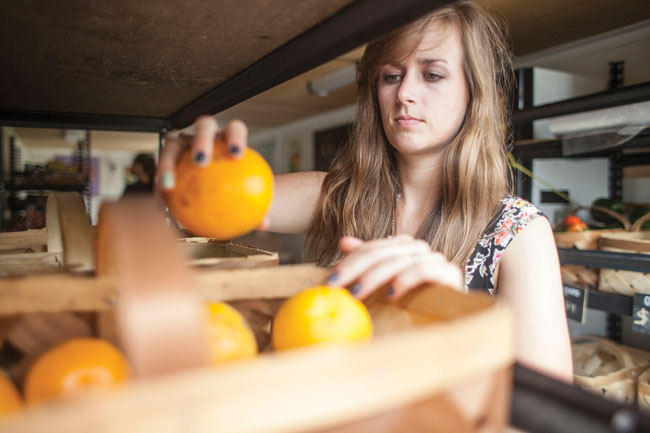
Nashville Mobile Market
Bringing food to Nashville’s ‘food deserts’
Food trucks are all the rage in Nashville, but the Nashville Mobile Market is a food truck of a different sort. It doesn’t serve up gourmet tacos or cupcakes; it’s a portable farmer’s market that makes regular appearances in communities where poverty is high and access to affordable fresh foods is low.
Nonprofit social enterprises such as the Nashville Mobile Market have become a natural and organic outgrowth of the Peabody experience. Leigh Gilchrist and Sharon Shields, who co-teach the Human and Organizational Development service-learning course Health Service Delivery to Diverse Populations, enjoy bearing witness to the birth of these ventures, and providing input and support as the students put those ideas into action.
“We’re an incubator for social entrepreneurship because we don’t stop at theory in our courses,” said Shields, associate dean for professional education and professor of the practice of education and human development. “We invite students to take theory and put it into practice through practicums, classes, internships and field experiences. We cultivate confidence, care and compassion, and by the time the students leave, they are doing phenomenal things.”
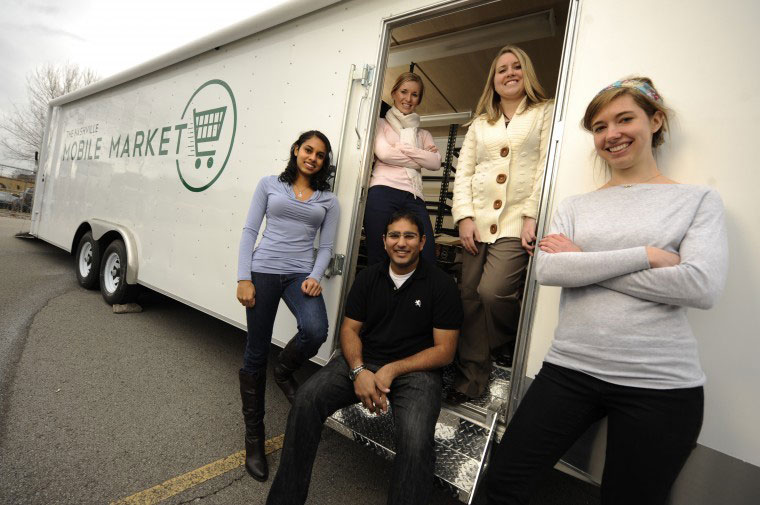
As an Arts and Science major, Ravi Patel took the Health Service Delivery class. While studying food deserts, Patel was inspired to begin the development of what would eventually become the Nashville Mobile Market.
Patel’s family is in the convenience store business, so he originally wrote a proposal on the need for a freestanding grocery store in the Edgehill community. Ultimately he determined the model was not financially sustainable. But he did learn something that sparked an idea. A community member shared with Patel that there once was a vendor the residents called “Market Man” who delivered fresh foods to the community in his pick-up truck.
“That got Ravi’s wheels going, and he refocused his efforts on a mobile version of his idea,” said Gilchrist, an assistant professor of the practice of human and organizational development.
In February 2010, Patel and some fellow students used a $65,000 grant from the Frist Foundation to purchase a trailer. The Center for Health Solutions hosted the Nashville Mobile Market, with the Vanderbilt University Medical Center and the university providing support. Baptist Healing Trust awarded a $51,000 grant to the group to help expand its program. That grant was recently renewed. Patel, now in his residency at Vanderbilt University Medical Center, said his introduction to social entrepreneurship at Peabody had a lasting impact on his life.
“The Peabody class provided a jump start to create a simple theoretical solution to a complex social and economic problem, but it also had a much broader impact on me,” Patel said. “It changed my paradigm for approaching problems by encouraging me to think out of the box. Now seven years after my first day in that class, I can still say that paradigm shift affects my work today as a surgical resident in molding ways of thinking about patient and community health.”
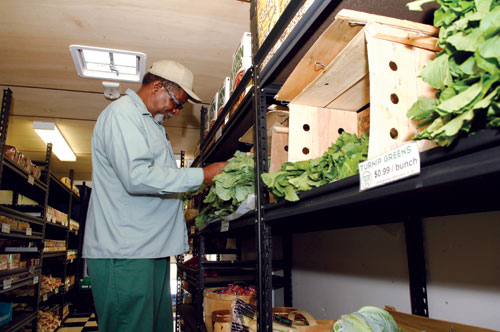
Now operated under the umbrella of the Vanderbilt School of Nursing and helmed by 2011 Vanderbilt Divinity School alumna Kelley Frances Fenelon, the Nashville Mobile Market continues its mission. It has been supported by hundreds of volunteers—Vanderbilt students, faculty, staff and members of the community—and operates in 15 sites in the major food deserts of Nashville, 35 hours per week.
The big white trailer is a welcome sight to area residents, who now have access to lean meats, fresh produce and nonperishable items at reasonable prices.
“Here in America, we have enough food that each of our neighbors should be able to eat the life-sustaining diet they deserve,” Fenelon said. “But our system is broken. By working to bring staples necessary for a healthy diet into neighborhoods that lack fresh food access, the Nashville Mobile Market gives us the chance to bring about social justice and systemic change.”
Teach Twice
HOD students create a way for stories to bridge cultures
Trevor Burbank, BS’12, who majored in human and organizational development, shares Fenelon’s passion for using business ventures to improve the lives of those in need. He is the founder of Teach Twice, another venture born out of Peabody’s social entrepreneurship efforts. Teach Twice is a social enterprise that works to improve the living conditions of other cultures by sharing their stories and folktales through children’s books. He is just one of many students at Peabody who are turning their passion for social change into practice.
Burbank, along with co-founder Jason Wen, a 2011 Arts and Science graduate, and fellow HOD major Scott Church, BS’12, wrote the business plan for the venture while taking a class with Vicki Davis, assistant professor of the practice of human and organizational development, and director of the HOD internship program. The like-minded students set to work building a team of undergraduate and graduate students to help.

Soon Teach Twice was born, a small book publishing business designed to share the stories of people across the world. The books generate income for programs that serve the needy in the countries from which the stories came.
Two years after Burbank and company launched Teach Twice, the enterprise has published two books—one from Uganda called My Precious Name and one from South Africa, Tall Enough. The books are carried at the Teach Twice website and at Parnassus books in Nashville, with Ingram Book Group serving as distributor.
“We want to empower the people we are serving but also have something tangible to give them,” Burbank said. “We came to recognize that stories are the basic building blocks that tie communities together.”
Teach Twice has received recognition from a Dell Social Innovation Challenge Grant and was presented at the New York Stock Exchange by the Kairos Society, an international nonprofit organization of entrepreneurs and innovators from top universities, as a well-run, student-led business. The next milestone on the route is to become self-sustaining. That will include more partnerships and the creation of networks of support.
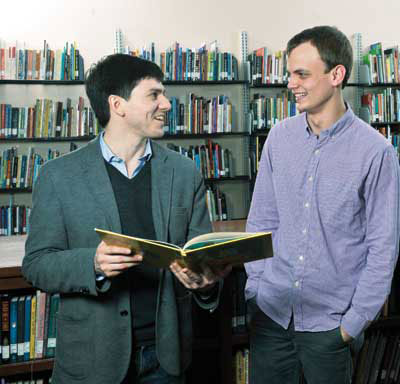
“We’ve built a nice framework,” Burbank said. “Our challenges are scaleability, distribution and sales.”
The organization recently hired its first paid staff member and CEO, Alyssa Van Camp, BS’10, MEd’13. Van Camp’s role with Teach Twice feeds into her dual passions for international education and domestic public school classrooms. She has spent time in Africa and Uganda and has been a teacher in public schools.
Van Camp acknowledges the publishing business can be challenging. “It’s hard to sell books,” she said. “The best thing to do is to diversify the revenue streams as much as you can and appeal to as many customers as you can.”
As the Teach Twice team looks to the future, it is building content and working hard to procure funding, recruit donors, create more partnerships and build distribution networks, both in schools and retail outlets.
This journey is not unfamiliar to Jim Schorr, an adjunct professor of management at the Owen Graduate School of Management at Vanderbilt. Through a partnership with Peabody, he has played an integral role in providing an outlet and sounding board for the students’ social entrepreneurship ideas. As part of his HOD course on social entrepreneurship, he assigns students to develop business plans and conduct feasibility studies.
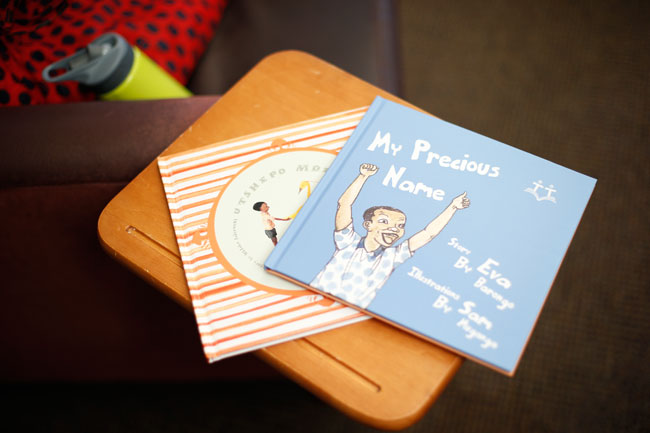
Schorr has a personal history with social entrepreneurship. He helped launch Net Impact, a management education organization that has inspired MBA students at 200-plus business schools to leverage their roles in the business world to improve the state of the world. He also founded Mekong Blue International, a social enterprise that empowers impoverished Cambodian women by marketing their handmade silk products in America.
“Young people today are inspired by the idea that career and service do not have to be separate pursuits,” Schorr said. “Social entrepreneurship is a path that provides students an opportunity to make a living and make a difference in the world, and the course has proven to be a terrific complement to Peabody’s established excellence in service learning and merging theory and practice.”
‘Curbside Chronicle’
HOD student Whitley O’Connor is creating jobs for the homeless
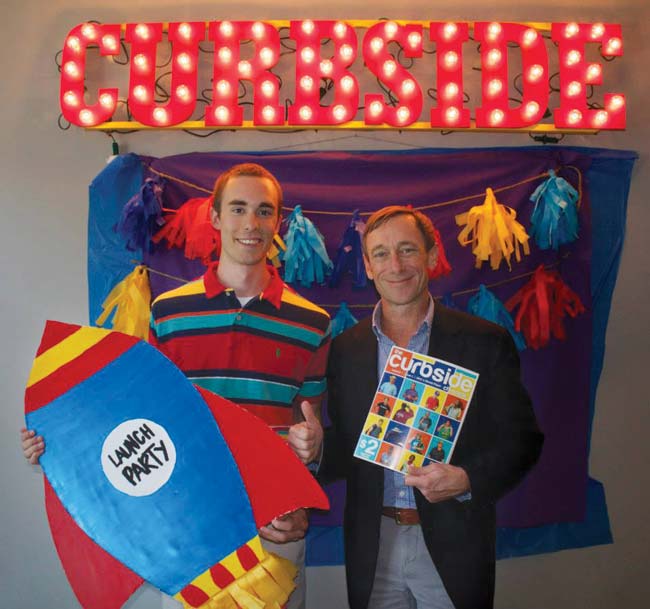
Whitley O’Connor never imagined his educational experience would include learning expressions like “flying a sign,” slang for a person who is chronically homeless who stands on a corner with a handwritten cardboard sign asking for help. It’s considered in homeless communities a step above panhandling.
Those kinds of terms have become part of the vocabulary of the senior majoring in human and organizational development and sociology.
He is spearheading the launch of the Curbside Chronicle, a magazine sold by the homeless population in Oklahoma City, with a goal of transitioning homeless individuals back into mainstream society.
During Jim Schorr’s social enterprise course, O’Connor mentioned that his hometown might benefit from a publication similar to The Contributor in Nashville. With Schorr’s guidance, O’Connor soon found himself part of a team shaping a business plan for the venture.

By summer 2013, O’Connor was using his Ingram Scholarship Summer Program stipend for the launch. Along with co-founder Ranya Forgotson, a University of Oklahoma student, he is working on site to get the business off the ground as part of his fall HOD internship.
Like The Contributor, Curbside Chronicle vendors go through training, sign a code of conduct and purchase copies to sell on street corners. About half the content is about social issues and is written by the homeless.
The remainder of the content includes local interest stories by a variety of writers. An early problem was volume. Even with just 10 initial vendors, the press run of 2,000 quickly ran out and O’Connor was scrambling to get more copies printed affordably.
“I can’t have vendors standing around. This is their job. If I don’t want them out there flying a sign—I’ve got to get a product in their hands,” he said.
O’Connor is committed to getting the program running smoothly by the end of the semester. “I see this as a once-in-a-lifetime opportunity,” he said.
Sustain-a-bears
Entrepreneurial students make child’s play of ‘up-cycling’
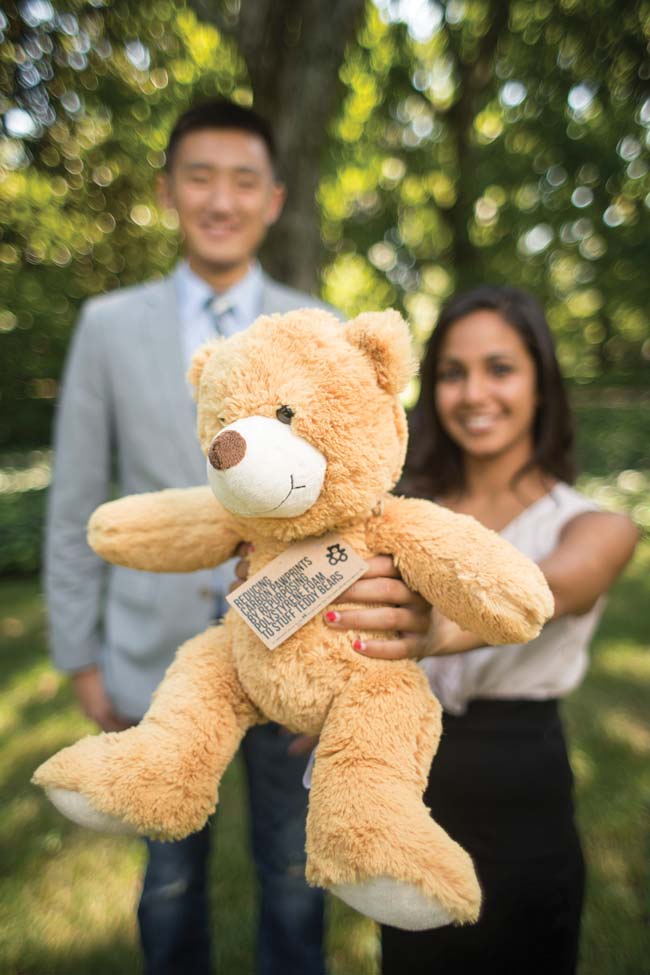
Amongst the detritus of Vanderbilt’s move-in day last year, an entrepreneurial venture was set into motion. Surrounded by leftover polystyrene piled up to be thrown away, Vanderbilt students Shilpa Mokshagundam, Whitley O’Connor, Jim Jin and Maryli Cheng happened to be brainstorming ideas for service projects. One of them absentmindedly crumbled a piece of the foamy white packaging and realized that when broken down it became soft, like stuffing in a teddy bear. The idea for Sustain-a-bears was born.
“We realized that would be a cool way to repurpose something,” said Mokshagundam, a senior majoring in biology and child development. “We could use it to build teddy bears, which is something people already are buying, so there is demand in the market.”
Since children feel a strong connection to stuffed animals, they reasoned, why not use them as an educational tool by connecting bears made of repurposed products to a book series? Entering their idea in the Clinton Global Initiative project forced them to devise a business plan, something that took many late nights of effort.
“Whitley and Maryli had taken the social entrepreneur class with Jim Schorr. We used a lot of what they learned in his class to put together the proposal,” Mokshagundam said. “The first bear was made in Rand, sitting for hours breaking down Styrofoam.”
The team used borrowed bear “skins” from a student Valentine’s Day activity. The effort was worthwhile as they were rewarded with fellowship funding and excellent feedback from the Clinton Global Initiative.
“We really want to be known for a good product and a good educational experience,” Mokshagundam said. They ultimately plan to create a fully repurposed bear and give money to charitable causes from their revenues.